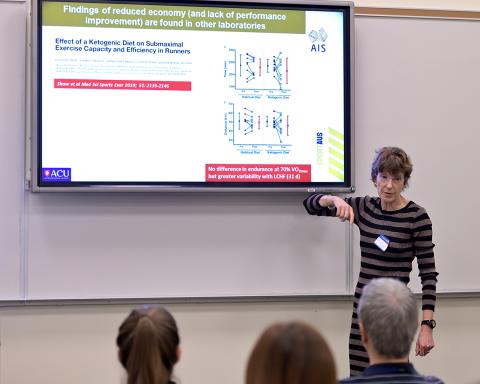The Skinny on High-Fat Diet
Does Keto Boost Sports Performance?

Photo: Marleen Van Den Neste
An athlete’s ultimate goal is to reach peak performance during competition. To boost the odds of success, elite contenders try to optimize each part of the formula—conditioning, practice and diet.
Sports prep used to include carb-loading—eating, for example, a big bowl of pasta to maximize energy in the form of glycogen stored in the muscles. Then along came reports of possible advantages for athletes eating a low-carb high-fat (LCHF), or ketogenic, diet. Keto trains the body to convert fat to energy.
Could carb-unloading help athletes reach the peak they’re pursuing?
To explore the state of the science on the topic, Dr. Louise Burke, chief of nutrition strategy at the Australian Institute of Sport and director since 2005 of the International Olympic Committee Diploma in Sports Nutrition, presented “Effects of a Ketogenic Diet on Exercise, Metabolism and Endurance Performance” at a recent seminar sponsored by NIDDK.
“My whole life is [centered] around helping athletes go faster, higher and stronger,” she said. “Looking at different diets and their ability to provide fuel for their event is part of my practice. And although the story around eating to provide high carbohydrate availability for the muscle is clear in showing performance benefits for endurance sport, it is still tantalizing to look at the body’s high larger fat reserves as untapped gold.”
First, Burke defined terms. She explained that at the lay level, endurance sports are “typified as submaximal events that involve exercise intensities of approximately 60 percent to 80 percent of the athlete’s maximum volume of oxygen inhaled and absorbed by the body—their ‘VO2max’”
However, she continued, this fails to capture the concept that high-performance athletes strive to compete at the highest possible proportion of their maximal aerobic energy production over the duration of their events—lasting at least 30 minutes of sustained or intermittent periods, and even more so at critical times.
“It’s about being able to produce energy on demand as economically as possible, according to the demands of the sport,” Burke said. “This requires both the muscle substrate—fuel—and the oxygen to support its oxidation.”
A distance runner herself, Burke visited NIH just days before she was set to compete in the New York City Marathon. Addressing the hype surrounding keto, fitness and conditioning, she traced the popularity of the diet.
Burke recalled being a first-year dietitian in 1983 when physician-scientist Dr. Stephen Phinney and colleagues wrote about “this incredibly innovative idea that we could train the muscle to be better able to use fat as an energy source.”
Phinney’s study compared performance results from five subjects who followed first a traditional carb-loading eating plan and then an LCHF diet. Both regimens produced similar performance if you considered the group average. However, Burke pointed out, the mean response to the LCHF diet was largely explained by the response of one cyclist who performed significantly better on the keto plan.
“The individual variability in response to the ketogenic diet is really quite profound,” she said, reviewing highlights of the original protocol.
“Now that I look back at the study with 35 years of experience with elite athletes,” Burke continued, “I also realize that if there was any study set up to show the benefits of keto, it would have been that study. It had well-trained cyclists who had time for keto adaptation to occur and the residual fatigue to abate. It allowed them to exercise at very moderate intensities at steady state—no need to power up a hill, break away from the pack or sprint to the line. And the carbohydrate trial was done without allowing the riders to gain the benefits of a pre-race carbohydrate-rich meal or further carb intake during the exercise protocol. It wasn’t a totally fair comparison between dietary approaches—and even then, the LCHF diet didn’t achieve a benefit. It just didn’t impair performance, on average.”
For many, that one outlier in that one study was plenty. Over the next few decades, articles and books touting keto spread rampantly across the sports world. And despite there being no additional scientific studies reproducing those initial findings, “anecdata”—personal testimony by elite athletes—professing the power of keto grew.
Burke and colleagues wanted hard evidence. They have been working for the past 4 years to understand the effects of LCHF on athletic performance.
At NIH in a packed FAES classroom, she discussed results from Project Supernova, a unique study concept that teamed clinical research with an elite athlete training camp atmosphere in which nutrition and exercise would be carefully controlled, monitored and overseen by sports nutritionists.
Supernova has tested dozens of elite athletes—world-class speed walkers—in separate groups.
One group followed a high-carb availability eating plan that matched fuel costs to carbohydrates going in.
“Every session of exercise they did was surrounded by carbs—before, during and after,” Burke explained. “That’s not what the guidelines of sports nutrition are any more, by the way. We now recommend a periodized-carbohydrate approach, matching the goal of the session to the nutritional strategy. So we also included a diet providing that type of support—overall, it contained the same amount of carbs as the high-carb availability approach. But it manipulated how it was spread over the week, so that some training sessions enjoyed full carb support while others included the additional training stimulus of low-glycogen exercise.”
Another group of speed walkers followed a keto diet. Supernova allocated the participants to these groups according to their beliefs about what would work best for them.
“It’s really important if you’re doing a performance study that your athletes believe in what they’re doing,” Burke said.
“So, what happens when you put world-class athletes at the beginning of a season together for 3½ weeks?” she asked. “Well, they all improved their aerobic capacity…all improved by the same amount. But then we looked at performance. Despite all improving fitness, [only] the carbohydrate-supported group improved their race times; we didn’t see any [speed] improvement in the keto group. There was about a 7 percent to 8 percent difference in performance between the carb-supported groups and the keto group.
“Something was happening with metabolism to change the economy of the oxygen utilization,” Burke noted. “There’s something about the keto diet that’s requiring more oxygen utilization to produce the same power or speed. Of course, we can explain that by examining the pathways of carbohydrate and fat oxidation. Although fat oxidation provides more energy per gram of substrate, it also requires more oxygen to produce the same amount of energy. That becomes important when an athlete is trying to work at very high proportions of the maximal aerobic capacity, because the limiting factor shifts to the oxygen supply rather than the available substrate.”
Burke and colleagues found that although elite athletes adapt quickly to converting stored fat to energy, this advantage becomes a liability when the event requires high-intensity aerobic performance.

Photo: Marleen Van Den Neste
“You absolutely can use fat as fuel,” she said. “You just need more oxygen to do it, and you may not be able to deliver that to the mitochondria to keep pace. That is why having a supply of carbohydrate, and muscle pathways primed to use it, provides ‘the top gear’ that wins so many endurance events.”
In subsequent versions of Supernova, researchers explored keto from other angles, including whether the diet improves oral microbiome health.
“It may cause an unexpected problem of knocking out the bacteria in our mouths that help us to convert the nitrate in vegetables to nitrate to feed our nitric oxide production,” Burke said.
Supernova also looked at whether LCHF could be used periodically, in combination with carb-loading diet models, to get the advantages of both eating plans. Turns out, “keto benefits interfere with our ability to use carbohydrate effectively, even when we have the stores,” she noted.
The bottom line is that the keto diet seems suited to a small subset of endurance sports—ultra-endurance events undertaken at modest intensities, especially where the athlete is unable or unwilling to continue to take in extra carbohydrate supplies.
In this day and age of social media, where a fervent post by even one LCHF advocate with thousands of followers can seem to outweigh scientific evidence from several clinical trials, Burke has been painted by some as anti-keto. Nothing could be further from the truth, she said.
She and the Olympic-caliber athletes and trainers she works with want whichever nutrition plan will provide optimum performance at the precise times that competitors need it. And everyone ought to want proof of what works, not hearsay.
“There is room in sport for keto,” Burke concluded. But it shouldn’t be seen as a miracle diet for all athletes. “Furthermore, even with a carb-supported approach for the majority of endurance events, athletes need a targeted and personalized approach to determine the best nutrition strategy for training and racing.
“All diets exist in both ‘good’ and ‘bad’ forms,” she concluded, pointing out that consuming “fat bombs” or “dirty keto”—overeating or otherwise abusing the tenets of LCHF—is not healthy and obviously will not boost any athlete’s performance. “I say, whatever diet you’re on, keep it real.”
